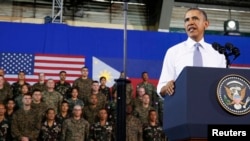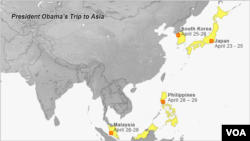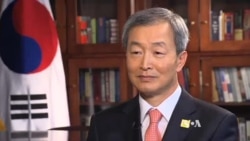TOKYO —
U.S. President Barack Obama has arrived in Japan for a weeklong tour of Asia. The visit aims to reassure allies who are nervous about U.S. defense cutbacks as China moves to expand its influence in the region.
Security concerns over China's territorial claims and North Korea's nuclear program will be a major focus of President Obama's trip, which includes stops in Japan, South Korea, Malaysia, and the Philippines.
President Obama began the first full day of his state visit to Japan Thursday with a call on Emperor Akihito at the Imperial Palace.
Obama was greeted at the park-like complex by a military honor guard, and children holding U.S. and Japanese flags. The president also had a private meeting with the emperor.
The eight-day tour began in Tokyo with a meeting with Prime Minister Shinzo Abe.
At the start of their summit, Obama said it is important the United States and Japan work together to deal with "regional hot spots around the globe" and to ensure "a strong set of rules that govern the international order."
It was nearly three years ago that the Obama administration announced what it called the "Asia pivot." The term described a shift in foreign policy focus to Asia as the administration concluded wars in Iraq and Afghanistan.
But Asian allies have seen few U.S. military resources shifted to the region as the United States makes defense cuts, all while China builds up its military and pushes to gain control of more of the East and South China Seas.
China is not one of the stops on the trip, but is on the minds of Obama and his Japanese allies, who are locked in a territorial dispute with Beijing over a group of small islands in the East China Sea.
Those islands, known in Japan as the Senkaku and in China as the Diaoyu, are at the heart of Japan's concerns about the U.S. commitment to defend Japan.
The United States says it will not take sides in the dispute. But prior to landing in Tokyo, President Obama told the Japanese newspaper Yomiuri Shimbun the islands fall under the U.S. mutual defense treaty with Japan, indicating the United States would defend Japan if China attacks and tries to take the islands by force. Obama said the United States opposes unilateral attempts to undermine Japan's administration of the islands.
Speaking to reporters last Friday, National Security Advisor Susan Rice said the president's visit is an opportunity to underscore his continued focus on the Asia Pacific region, and to show the U.S. remains committed to the region's security.
“Whether it ought to be viewed as a containment of China, I would say this trip has a very positive, affirmative agenda and that is how we are looking at it," Rice said, "as an opportunity to solidify and modernize our alliances and partnerships; as an opportunity to advance our economic agenda.”
Obama's Tokyo visit late Wednesday aims to reassure Japan the U.S. pivot is on track.
Japanese Prime Minister Shinzo Abe said he wants to strengthen the Japan-U.S. alliance so it can contribute to peace and prosperity in the Asia-Pacific region.
President Obama is also trying to help ease a strain in relations between Japan and South Korea over atrocities committed by Japanese forces against Koreans in the first part of the 20th century. U.S. officials believe the historical disputes are distracting from current security threats such as North Korea.
South Korea is the next stop for President Obama, who will also travel to Malaysia and the Philippines.
The president had originally scheduled this visit last year, but cancelled it due to the government shutdown that resulted from a federal budget crisis.
WATCH: Interview with Ahn Ho-young Ambassador of the Republic of Korea to the United States on President Obama's trip to Asia
Security concerns over China's territorial claims and North Korea's nuclear program will be a major focus of President Obama's trip, which includes stops in Japan, South Korea, Malaysia, and the Philippines.
President Obama began the first full day of his state visit to Japan Thursday with a call on Emperor Akihito at the Imperial Palace.
Obama was greeted at the park-like complex by a military honor guard, and children holding U.S. and Japanese flags. The president also had a private meeting with the emperor.
The eight-day tour began in Tokyo with a meeting with Prime Minister Shinzo Abe.
At the start of their summit, Obama said it is important the United States and Japan work together to deal with "regional hot spots around the globe" and to ensure "a strong set of rules that govern the international order."
It was nearly three years ago that the Obama administration announced what it called the "Asia pivot." The term described a shift in foreign policy focus to Asia as the administration concluded wars in Iraq and Afghanistan.
But Asian allies have seen few U.S. military resources shifted to the region as the United States makes defense cuts, all while China builds up its military and pushes to gain control of more of the East and South China Seas.
China is not one of the stops on the trip, but is on the minds of Obama and his Japanese allies, who are locked in a territorial dispute with Beijing over a group of small islands in the East China Sea.
Those islands, known in Japan as the Senkaku and in China as the Diaoyu, are at the heart of Japan's concerns about the U.S. commitment to defend Japan.
The United States says it will not take sides in the dispute. But prior to landing in Tokyo, President Obama told the Japanese newspaper Yomiuri Shimbun the islands fall under the U.S. mutual defense treaty with Japan, indicating the United States would defend Japan if China attacks and tries to take the islands by force. Obama said the United States opposes unilateral attempts to undermine Japan's administration of the islands.
Speaking to reporters last Friday, National Security Advisor Susan Rice said the president's visit is an opportunity to underscore his continued focus on the Asia Pacific region, and to show the U.S. remains committed to the region's security.
“Whether it ought to be viewed as a containment of China, I would say this trip has a very positive, affirmative agenda and that is how we are looking at it," Rice said, "as an opportunity to solidify and modernize our alliances and partnerships; as an opportunity to advance our economic agenda.”
Obama's Tokyo visit late Wednesday aims to reassure Japan the U.S. pivot is on track.
Japanese Prime Minister Shinzo Abe said he wants to strengthen the Japan-U.S. alliance so it can contribute to peace and prosperity in the Asia-Pacific region.
President Obama is also trying to help ease a strain in relations between Japan and South Korea over atrocities committed by Japanese forces against Koreans in the first part of the 20th century. U.S. officials believe the historical disputes are distracting from current security threats such as North Korea.
South Korea is the next stop for President Obama, who will also travel to Malaysia and the Philippines.
The president had originally scheduled this visit last year, but cancelled it due to the government shutdown that resulted from a federal budget crisis.
WATCH: Interview with Ahn Ho-young Ambassador of the Republic of Korea to the United States on President Obama's trip to Asia









